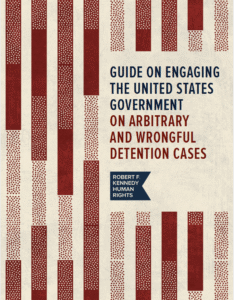Journalists working in Cambodia and Việt Nam are routinely threatened, subject to mistreatment, and detained for their reporting and commentary, with many imprisoned and denied basic rights, according to two new reports on press freedom and freedom of expression submitted to the United Nations. A report on Việt Nam was jointly submitted by Freedom House, Robert F. Kennedy Human Rights (RFKHR), and the Committee to Protect Journalists (CPJ), and a separate report on Cambodia was jointly issued by Freedom House and RFKHR, both with the support of Covington & Burling LLP.
The joint submissions are being released on November 2nd, the International Day to End Impunity for Crimes Against Journalists, ahead of the two countries’ Universal Periodic Review (UPR) taking place in Geneva in May 2024. The groups’ submissions highlight the cruel, inhuman or degrading treatment of journalists and human rights defenders, lengthy pre-trial and arbitrary detention, and incommunicado holdings over the past five years since the countries’ last UPR reports. Journalists are also regularly arrested and imprisoned for lengthy periods of time pursuant to alleged criminal incitement and anti-state charges in relation to their work. In both reports, detained journalists and human rights advocates exercising their rights to freedom of expression were found to have been denied their right to a fair trial and appeals process. These conditions have resulted in a chilling effect on press freedom and freedom of expression in the two countries.
“Freedom House is proud to join partners in highlighting restrictions on press freedom and freedom of expression in Cambodia and Việt Nam,” said Margaux Ewen, Director of Freedom House’s Political Prisoners Initiative. “As we work to secure the release of human rights defenders arbitrarily detained for their journalism and online expression in both countries, it’s important that we also document the overall scale of repression before both countries undergo their human rights review.”
The situation is made worse by the introduction in recent years of cybersecurity laws restricting internet access and increasing state censorship of information available online. Both states have significantly increased control over internet and social media platforms, restricting access to information online in a significant curbing of press freedom and freedom of expression of journalists and human rights defenders.
In Việt Nam, social media platforms are subject to local laws requiring the removal of content deemed contrary to the state, which has resulted in thousands of posts and videos being removed every year. Many journalists have reported having their social media accounts restricted in response to their online activities.
Similarly in Cambodia, the government has introduced laws to monitor the media, used its power to revoke the licenses of several media outlets, and criminalized online expression. Among the most concerning cases regarding online reporting is that of Cambodian-American attorney and human rights activist Theary Seng, currently serving a six-year prison sentence for social media posts deemed treasonous and subjected to severe mistreatment and fair trial violations. The conditions of her detention were deemed by the UN Working Group on Arbitrary Detention to be in contravention of the Universal Declaration of Human Rights and the International Covenant on Civil and Political Rights.
In Việt Nam, acclaimed journalist Phạm Đoan Trang was sentenced to nine years in prison pursuant to anti-state charges following a one-day trial. Her case was marked by fair trial violations, and she was detained incommunicado for a full year notwithstanding requiring medical assistance. Trang, who reported on environmental issues, politics and human rights, was honored with CPJ’s International Press Freedom Award in 2022. Other Vietnamese journalists and their families are routinely harassed, barred from international travel, and subjected to house arrest or otherwise detained by state officials for reporting and commenting on political affairs.
“Journalist Phạm Đoan Trang’s imprisonment underscores Vietnam’s appalling record of censorship and shows why it continues to be one of the world’s largest jailer of journalists,” said Beh Lih Yi, CPJ’s Asia Program Coordinator. “As Vietnam transforms into a global manufacturing hub, investors must assess the risks and market conditions in their supply chains in a country where repression targeting journalists and human rights defenders still occurs frequently.”
Cambodia and Việt Nam are rated “Not Free” in Freedom House’s Freedom in the World 2023 report. Cambodia has an overall score of 24/100, while Việt Nam has an overall score of 19/100. In Freedom House’s Freedom On the Net 2023 report, Cambodia has an overall score of 44/100, while Việt Nam has an overall score of 22/100. Both countries have consistently appeared on CPJ’s annual prison census.
“Freedom of the press is the cornerstone of any just society, and its suppression can never be tolerated. The joint submissions on press freedom in Cambodia and Việt Nam underscore a grave concern: the persistent violations against journalists. Let us remember that journalism is not a crime, and these injustices must end. As we approach the Universal Periodic Review, it is time for these governments to heed the call of justice and safeguard the freedom of the press for the sake of their people and the world,” emphasized Kerry Kennedy, president of RFKHR.
“Through Covington’s Kurt Wimmer Media Freedom Pro Bono Initiative, our attorneys provide pro bono support on media freedom matters, seeking to protect and advance press freedom and freedom of expression, and promote the safety of journalists and human rights defenders,” said Peter Lichtenbaum, a partner at Covington & Burling LLP. “Our work on the joint submission to the United Nations UPR Review process assessing Việt Nam’s and Cambodia’s actions with respect to press freedom and freedom of expression supports these objectives.”
Among the recommendations in the reports, the groups urged the immediate release of journalists and human rights defenders exercising their free expression both countries have arbitrarily detained, end the mistreatment of these prisoners, and uphold their rights to a fair trial and appeal. They also called for the review of vague and overbroad laws which are misused to imprison journalists and to repeal the cybersecurity laws used to censor information online.
Cambodia and Việt Nam will undergo the UPR from 29 April to 10 May 2024 as part of the 46th session of the Universal Periodic Review Working Group in Geneva. To read the full submissions, please click here for the Cambodia report and here for the Việt Nam report.




